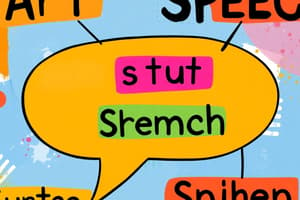Podcast
Questions and Answers
What type of noun is 'Paris'?
What type of noun is 'Paris'?
- Common Noun
- Concrete Noun
- Abstract Noun
- Proper Noun (correct)
Which of the following is an example of an action verb?
Which of the following is an example of an action verb?
- Be
- Is
- Run (correct)
- Have
What is the main function of an adverb in a sentence?
What is the main function of an adverb in a sentence?
- To modify a verb, adjective, or another adverb (correct)
- To connect clauses
- To describe a person or thing
- To show the relationship between words
Which of the following is a demonstrative pronoun?
Which of the following is a demonstrative pronoun?
Which type of conjunction is 'although'?
Which type of conjunction is 'although'?
What kind of adjective is 'few'?
What kind of adjective is 'few'?
Which sentence correctly uses a preposition?
Which sentence correctly uses a preposition?
What defines an interjection?
What defines an interjection?
Flashcards are hidden until you start studying
Study Notes
Parts of Speech Overview
Parts of speech are categories that describe the function of words in sentences. There are eight primary parts of speech in English.
1. Noun
- Definition: A word that represents a person, place, thing, or idea.
- Types:
- Proper Nouns: Specific names (e.g., John, Paris)
- Common Nouns: General names (e.g., city, dog)
- Abstract Nouns: Ideas or concepts (e.g., love, freedom)
- Concrete Nouns: Physical objects (e.g., apple, car)
2. Pronoun
- Definition: A word that substitutes for a noun.
- Types:
- Personal Pronouns: Refer to specific persons or things (e.g., he, she, it)
- Demonstrative Pronouns: Point to specific things (e.g., this, those)
- Interrogative Pronouns: Used for questions (e.g., who, what)
- Relative Pronouns: Introduce relative clauses (e.g., who, which)
3. Verb
- Definition: A word that expresses action or state of being.
- Types:
- Action Verbs: Show physical or mental action (e.g., run, think)
- Linking Verbs: Connect the subject to a subject complement (e.g., be, appear)
- Auxiliary Verbs: Help the main verb (e.g., is, have)
4. Adjective
- Definition: A word that modifies or describes a noun or pronoun.
- Types:
- Descriptive Adjectives: Describe qualities (e.g., beautiful, tall)
- Quantitative Adjectives: Indicate quantity (e.g., few, several)
- Demonstrative Adjectives: Specify nouns (e.g., this, those)
- Possessive Adjectives: Show ownership (e.g., my, their)
5. Adverb
- Definition: A word that modifies a verb, adjective, or other adverbs.
- Types:
- Manner: How something is done (e.g., quickly, softly)
- Place: Where something happens (e.g., here, everywhere)
- Time: When something happens (e.g., now, later)
- Frequency: How often (e.g., always, seldom)
6. Preposition
- Definition: A word that shows the relationship between a noun or pronoun and other words in a sentence.
- Examples: in, on, at, between, through
7. Conjunction
- Definition: A word that connects clauses or sentences.
- Types:
- Coordinating Conjunctions: Join equal elements (e.g., and, but, or)
- Subordinating Conjunctions: Join dependent clauses to independent clauses (e.g., because, although)
- Correlative Conjunctions: Pairs of conjunctions (e.g., either/or, neither/nor)
8. Interjection
- Definition: A word or phrase that expresses strong emotion or surprise.
- Examples: wow, ouch, hey, hooray!
Summary
Understanding parts of speech is fundamental to mastering the structure and function of the English language, aiding in grammar, writing, and comprehension.
Parts of Speech
- Eight primary parts of speech in English
- Words are categorized based on their function in a sentence
Noun
- Represents a person, place, thing, or idea
- Types:
- Proper Nouns: Specific names (e.g., John, Paris)
- Common Nouns: General names (e.g., city, dog)
- Abstract Nouns: Ideas or concepts (e.g., love, freedom)
- Concrete Nouns: Physical objects (e.g., apple, car)
Pronoun
- Substitutes for a noun
- Types:
- Personal Pronouns: Refer to specific persons or things (e.g., he, she, it)
- Demonstrative Pronouns: Point to specific things (e.g., this, those)
- Interrogative Pronouns: Used for questions (e.g., who, what)
- Relative Pronouns: Introduce relative clauses (e.g., who, which)
Verb
- Expresses action or state of being
- Types:
- Action Verbs: Show physical or mental action (e.g., run, think)
- Linking Verbs: Connect the subject to a subject complement (e.g., be, appear)
- Auxiliary Verbs: Help the main verb (e.g., is, have)
Adjective
- Modifies or describes a noun or pronoun
- Types:
- Descriptive Adjectives: Describe qualities (e.g., beautiful, tall)
- Quantitative Adjectives: Indicate quantity (e.g., few, several)
- Demonstrative Adjectives: Specify nouns (e.g., this, those)
- Possessive Adjectives: Show ownership (e.g., my, their)
Adverb
- Modifies a verb, adjective, or other adverbs
- Types:
- Manner: How something is done (e.g., quickly, softly)
- Place: Where something happens (e.g., here, everywhere)
- Time: When something happens (e.g., now, later)
- Frequency: How often (e.g., always, seldom)
Preposition
- Shows the relationship between a noun or pronoun and other words in a sentence
- Examples: in, on, at, between, through
Conjunction
- Connects clauses or sentences
- Types:
- Coordinating Conjunctions: Join equal elements (e.g., and, but, or)
- Subordinating Conjunctions: Join dependent clauses to independent clauses (e.g., because, although)
- Correlative Conjunctions: Pairs of conjunctions (e.g., either/or, neither/nor)
Interjection
- Expresses strong emotion or surprise
- Examples: wow, ouch, hey, hooray!
Summary
- Mastering parts of speech is crucial for understanding English grammar, writing, and comprehension
Studying That Suits You
Use AI to generate personalized quizzes and flashcards to suit your learning preferences.




